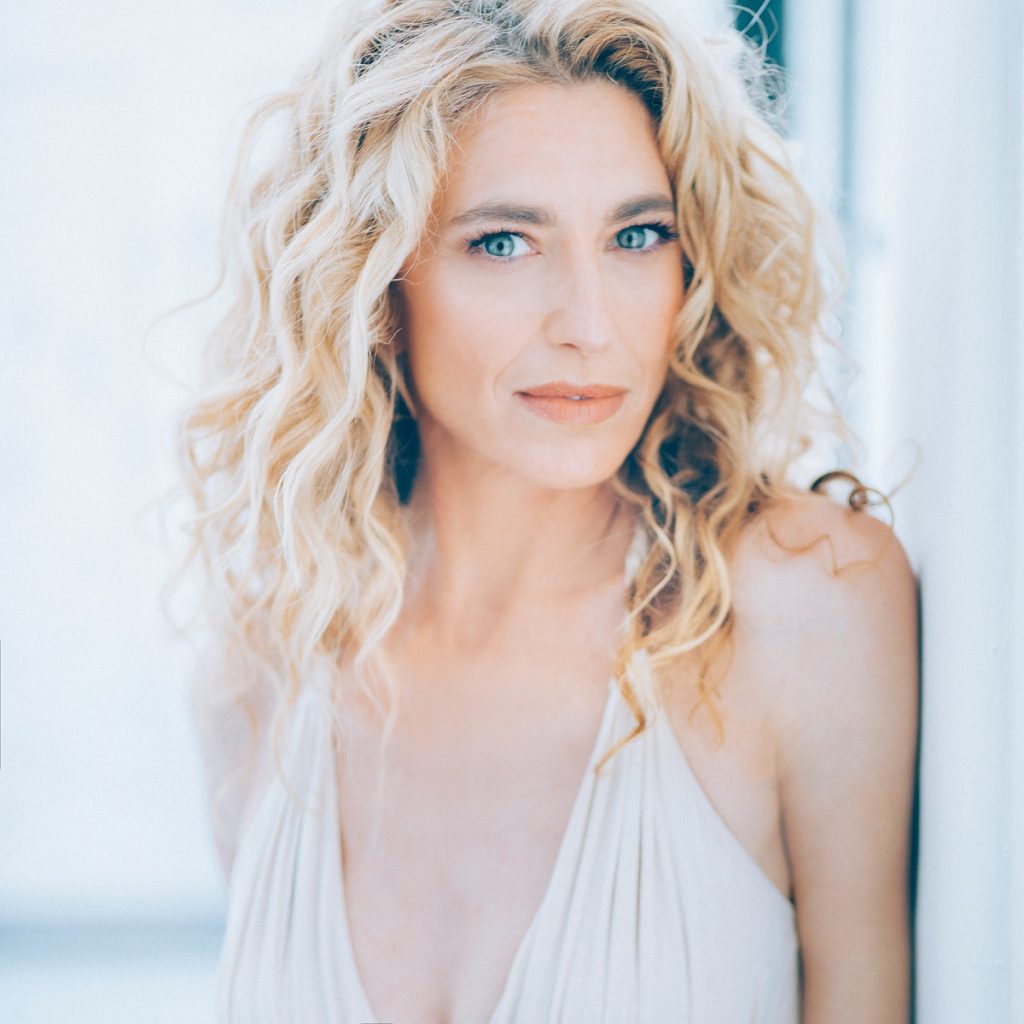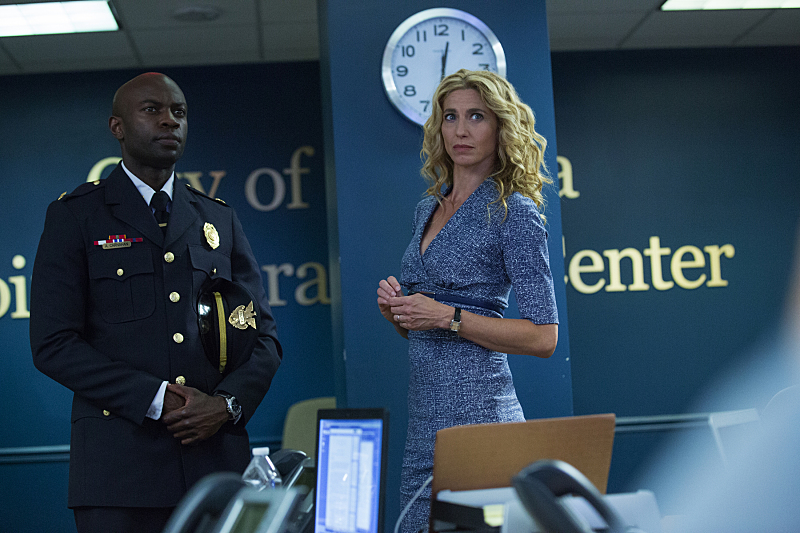‘Containment’s’ Claudia Black Discusses Filming the Intense Show, Bonding with Co-Stars, And Her Possible Return on ‘The Originals’

Actress Claudia Black stars in the all-new CW miniseries Containment. Photo Credit: Nate Taylor.
Australian actress Claudia Black is ready to pack the proverbial punches once more on the CW’s new show, Containment. This time she has a crucial role: saving the city of Atlanta from a deadly virus outbreak before it can spread nationwide.
With a voice as enchanting as her on-screen personas, Black is no stranger to the world of science fiction. Showcasing unparalleled depth and bravado, this mother-of-two has had noteworthy stints in shows like Farscape and Stargate SG-1. Through Containment, though, she gets to expand her body of work by delivering a role on a series which breaks boundaries and influences one’s choices. Unexpectedly, the CW has become the perfect platform to do just that.
The network has been expanding their viewer demo beyond teenagers by catering to a wider audience, one which values exceptional storytelling, real-to-life acting and innovative worlds. Their female leads on Jane the Virgin (Gina Rodriguez), The 100 (Eliza Taylor) and Crazy Ex-Girlfriend (Rachel Bloom), to name a few — shows which have both fresh concepts and ideas, and not to mention are picking up Golden Globe category nominations (and winning them!) — are strong and full of conviction. Black will join these ranks with Containment as she steps into the shoes of the dominant, cool-headed and powerful Sabine Lommers, a doctor sent by none other than the President of the United States to take charge of the quarantine that’s been brought on by a mysterious epidemic in the city of Atlanta. Of course, it would be even better if she could find a cure before it reaches the next city or state — no pressure there.
Based on a Belgian series titled Cordon, which quickly became a fan-favorite, the American version will reunite Black with her The Originals producer Julie Plec (also known for her work on The Vampire Diaries) with whom she says she shares a phenomenal bond on and off-screen. She promises that this version definitely involves a good dose of violence and paranoia, but also exudes a lot more heart and hope than the original.
GALO recently spoke to Black where she shared her hopes for Containment, how the show depicts our world and culture, and her experiences after being in the industry for 20 years.
GALO: Are you excited for the premiere of Containment?
Claudia Black: Oh, absolutely! It’s surreal because we’ve spent a lot of time making it and getting it ready, and now it’s finally going to be seen! It’s going to be interesting to see what people think.
[pullquote align=”right” cite=”There is a misconception that acting is about pretending. I believe actors play on their vulnerability and are risking it all, and then it becomes universal and accessible to the people.” link=”” color=”#ff0000″ class=”” size=”15″][/pullquote]
GALO: The trailer itself looks so intense and emotional — and it very well should be, seeing as the show is all about a fatal virus spreading and with so many people involved, it’s bound to be a tense situation. I was curious as to what pulled you toward this kind of a show in the first place? Can you speak to your initial reaction after reading the script?
CB: It started when I saw the original version from Belgium. It’s so beautifully executed; it has very subtle storytelling and [is] beautifully made. I hadn’t really experienced something of that quality before. I know we are making it at a different pace — they took seven years to make one season. And they only planned to make one season, but due to public outcry, they are doing a second season now.
American TV doesn’t work at that kind of pace. We have the benefit of all of their planning and thoughtfulness, and I think that Julie Plec is a really daring storyteller. She has got a huge heart and she is, I think, an empath. She really feels all of the stories she writes, so there is always a depth to the relationships.
I am not a big proponent of violence in the media, and yet when we researched this with the CDC (The Centers for Disease Control and Prevention), they guided the showrunners to take it in a truly horrific way [by explaining how] a virus of this kind would actually manifest and present. It would be quick, brutal and visually shocking, and so that direction actually came from the scientists who were asked to perform a public service. By depicting it in a realistic way, [we can showcase how] this would mutate, spread and affect people’s lives and health.
GALO: It definitely feels as if your character has a very leader-like quality to her. She seems like she is in control, strong, and guides people. What was it like for you to take something like that on? And did you notice any similarities between the two of you?
CB: She is one of the most high-status characters I have ever played. Her official title is assistant director for health, safety and preparedness, so she would have been directly appointed by the President. She is really at the top of the food chain when it comes to making the decisions about the city’s and country’s safety, and then if it goes global, she has got that responsibility on her shoulders, [too]. She comes from a medical background. She is in a very male-dominated industry and she has to make really unpopular decisions; they are extreme and yet necessary.
A lot of the characters that I have played over the years may have been extremely powerful, but there was something fantastical about them because there was [this] veil of science fiction laced over the storytelling. Now to be playing something that’s shot in Atlanta as Atlanta… Well, it’s very rare in film these days that you can actually shoot in a city and use the city itself as a character in the piece, which makes it more real.
[Going back to my character], she is very controlling and confident. I was wrestling with her power and where it comes from. It’s interesting to see the parts of her that become revealed little by little, especially with David Gyasi’s character, Alex “Lex” Carnahan. That is really the key dynamic for her throughout the season. He is such a juxtaposition for her. She chooses him because he is likeable and he gets to be everything she can’t be.
GALO: How different is Containment going to be from Cordon, especially in terms of storytelling?
CB: I think it will be quite different. We have sown different seeds. It doesn’t have the ambitious bible of a show like The Originals, which is so complex and layered that you can see it is built to last as it literally spans through the millennia. This one is very tight, subtle storytelling, so I think some of the subtleties are different from Cordon, which I stopped watching midway [through] because I did not want to be influenced by it for the choices I was making, because I knew we would have to be different for the American version. I think there is more heart in this one; there are more interesting relationship dynamics — and I think that is a reflection of Julie herself and what makes her tick and what sucks her into a story.
GALO: I agree. It’s important to have some heart on the show to make it more real.
CB: Absolutely. And I think that is what we ask from the audiences as well — that they prepare to be uncomfortable. And in return we give them some really lovely relationships to follow and to fight for.

Pictured (L-R): David Gyasi as Major Lex Carnahan and Claudia Black as Dr. Sabine Lommers in Containment — “I To Die, You To Live.” Photo Credit: Bob Mahoney/The CW. © 2016 The CW Network, LLC. All rights reserved.
GALO: I think that’s great. I know that because of the violence and the kind of case that the show is building, it must have been intense to shoot it. Was it very overwhelming to be a part of this, and is there any particular scene or a day on the set when everyone was kind of overcome by what you guys were shooting?
CB: Oh, yes! Without giving away any spoilers, toward the end of filming a lot of us were still in town catching up, and we would go on the set and be there for people’s final scenes of the season. It was a rare event. I was commuting, [so] I would only come in to shoot my scenes and leave.
My character was normally apart from the part that is contained, she [would be] outside the cordon, pretending not to bear witness to the real effects of this virus. She is seeing the imagery but she is not connected [to it]. She doesn’t have to help loved ones or stay away from loved ones who are sick. And she is also clinical [in her way of being] because of her medical background. But being on the set and seeing what other people had to portray became hard on everyone. The crew was affected. They were meticulous with what they wanted, and sometimes there would be a lot of takes on the camera and it was extremely challenging for the actors. They all did an amazing job at being disciplined and giving it their everything. We have an incredible makeup department. We planned and choreographed the stages of the virus visually, and those visual symbols become important when you start to see the deterioration in someone and it looks so realistic.
GALO: I bet. I know we touched upon this briefly before, but I feel like the show is so much rooted in reality because of how there is this fear in our minds that something like this can actually happen. How did working on this show change your perspective about something of this magnitude?
CB: I just don’t watch the news. I get my news from reliable sources, and I know there is so much fear in the media. I love the campaign of this show — the posters and such — because it says, “fear is viral, hope is contagious.” I think you can’t feed people a sturdy diet of fear and offer nothing else. This show has very important messages about who we are, the choices we make, and the consequences of those choices on a micro and macro cosmic level. It’s interesting because there has been so much focus on fear — politically and in terms of the planet — and it is like an apocalyptic feeling. This virus is terrifying because it is something you cannot see unless it is under a microscope, and yet it can wipe us all out.
